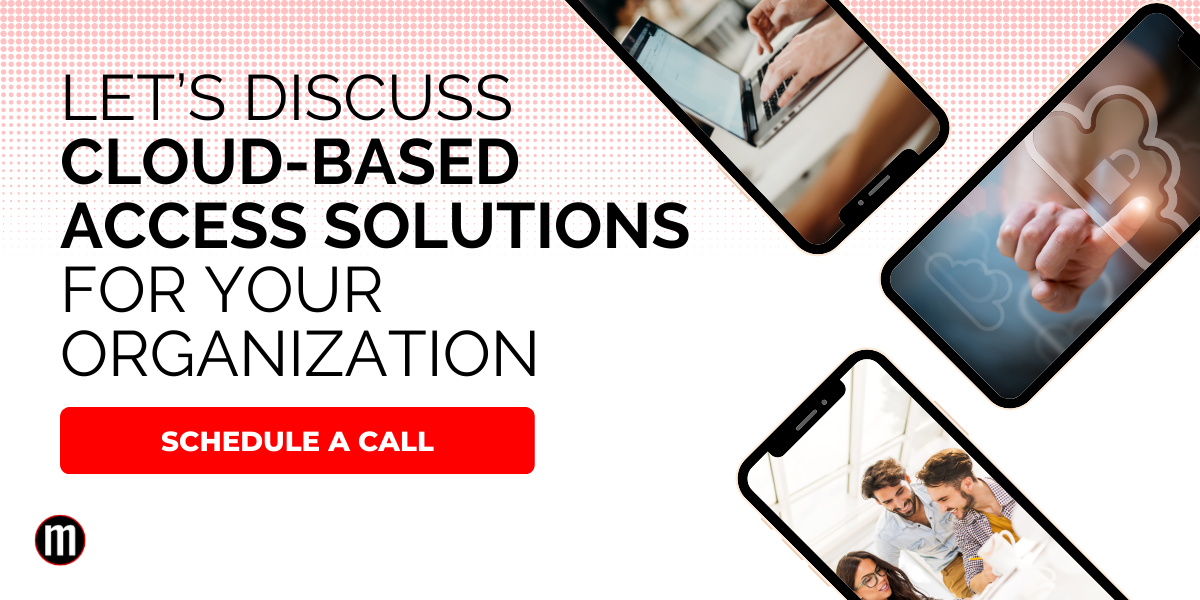Is your business still relying on VPNs? With the rise of remote and hybrid work, your business operations have likely undergone a transformation. Your employees can now connect to your corporate network from anywhere around the globe. While VPNs were initially tailored for the demands of traditional office settings, they might fall short of meeting the needs of your more modern workforce.
Virtual Private Networks (VPNs) have been a reliable business choice for years. However, the paradigm is shifting towards more effective cloud-based solutions. In fact, 88% of companies report being concerned that VPNs jeopardize their ability to maintain a secure environment which is cause for concern if you’re still depending on it to keep your business safe. (Source)
In this article, we’ll explore the limitations of VPNs in the context of today’s remote and hybrid workforce and shed light on how and why cloud-based solutions are surpassing traditional VPNs.

Understanding VPNs and Cloud-Based Solutions
Before we get into the specifics, let’s lay the groundwork by briefly outlining what VPNs and cloud-based access solutions are and how they can be an asset to your business.
Virtual Private Networks (VPNs): A VPN is a network technology that creates a secure and encrypted connection between a user and a private network, often over the public internet. By routing your internet traffic through an encrypted tunnel, VPNs provide a level of privacy and security, making it difficult for unauthorized individuals to intercept your data. VPNs are commonly used by remote workers to access company resources securely, as well as by businesses to establish secure connections between different offices.
Cloud-Based Access: Cloud-based access, on the other hand, refers to solutions that enable remote and hybrid workers to connect to business resources and applications hosted in the cloud. These solutions offer flexibility, scalability, and streamlined connectivity, ensuring that your team can collaborate effectively regardless of their location.
While both cloud-based solutions and traditional VPNs offer remote access and security, their focuses and functionalities differ. Cloud-based solutions are broader in scope, often emphasizing collaboration, storage, and scalable resources.

Limitations of VPNs for Modern Business Needs
VPNs have been a staple of remote work security. However, they come with certain limitations that are increasingly problematic in today’s business landscape:
- Performance and Scalability: As your business expands and the number of remote or hybrid workers increases, VPNs can struggle to keep up with the demand. The centralized nature of VPNs can lead to congestion and decreased performance, especially during peak usage times or office internet outages. Additionally, the need to manage hardware and network infrastructure for scaling can become a significant operational burden.
- Complexity and User Experience: VPNs often require users to install dedicated software, configure settings, and occasionally troubleshoot connectivity issues. For employees not well-versed in technical matters, this can lead to frustration and reduced productivity. Furthermore, compatibility issues may arise with certain devices and operating systems.
- Security Risks: While VPNs encrypt traffic between the user and the network, they do not prevent attacks that target vulnerabilities within the network itself. Once a user gains access through the VPN, they can potentially move laterally within the network and exploit weaknesses. This is especially concerning in a hybrid work environment where devices may have varying levels of security.
- Limited Protection for Cloud Services: In the era of cloud computing, businesses rely heavily on cloud-based applications and services. Traditional VPNs are less effective in securing cloud traffic, as they were designed primarily for securing connections to on-premises networks. This leaves potential security gaps that malicious actors could exploit.

Advantages of Cloud-Based Access Solutions
Given these limitations, cloud-based solutions offer a range of advantages tailored to modern business needs:
- Flexible Scalability: Cloud-based access solutions offer the flexibility to scale resources up or down based on demand. This is particularly valuable for businesses experiencing fluctuating workloads or seasonal changes
- Simplicity and Ease of Use: Cloud-based solutions often come with user-friendly interfaces that require minimal setup on the user’s end. This is a boon for businesses with a diverse range of technical expertise among their employees. With cloud-based access, you can ensure that your team can focus on their tasks without grappling with complex technical configurations.
- Comprehensive Connectivity: Cloud-based access platforms ensure seamless connectivity to business resources hosted in the cloud. This empowers your remote and hybrid workers to collaborate effectively, access applications, and contribute to projects without disruptions.
- Protection for Cloud Services: Cloud-based solutions are well-equipped to secure cloud traffic effectively. They can safeguard data and applications regardless of where they are hosted, bridging the gap that traditional VPNs often struggle to address. This is especially pertinent as businesses increasingly rely on cloud-based collaboration tools and applications. Also, depending on the service, you can limit who can access what based on certain criteria.
- Conditional Access: Conditional access policies can further enhance security in cloud-based environments by allowing organizations to control access to their resources based on specific conditions, such as user location, device compliance, and authentication strength. This adaptive approach ensures that only authorized users with the right credentials and compliant devices can access sensitive data and applications, bolstering overall cloud security.

Making the Transition to Cloud-Based Access
Transitioning from traditional VPNs to a cloud-based solution requires a strategic approach, yes. But it’s not impossible. Following the steps below and partnering with a smart IT company can help ease the transition. Here’s how:
- Assessment: Evaluate your current technology infrastructure and identify the pain points that VPNs are causing. Consider factors such as performance, user experience, and the level of protection against emerging challenges.
- Vendor Selection: Research reputable cloud-based solution providers that align with your business needs. Top choices include OneDrive and SharePoint. Look for solutions that offer streamlined connectivity, scalability, and a user-friendly experience.
- Migration Plan: Develop a migration plan that outlines how you will transition from VPNs to cloud-based access. This plan should include communication with your remote and hybrid workers, training resources, and a timeline for the migration process.
- Training and Support: Ensure that your employees are well-prepared for the transition. Provide training sessions and resources to help them understand the new protocols and tools. Additionally, offer reliable support channels for addressing any questions or issues that may arise.

Embrace the Future of Access
It’s essential to recognize the evolving landscape of remote and hybrid work and adjust your technology strategy accordingly. While VPNs have served their purpose well, the limitations they pose in terms of performance, complexity, and protection make them less suitable for today’s dynamic business environment. Cloud-based access solutions offer a robust alternative that not only addresses these limitations but also provides comprehensive connectivity and collaboration capabilities.
By embracing cloud-based access, you’re not only enabling seamless collaboration for your business but also ensuring that your remote and hybrid workers can operate in a connected and productive manner. As you explore the realm of cloud-based access options, you’re taking a proactive step towards a more efficient and collaborative future for your business. If you’re ready to take the next step in protecting your business from cyber threats, contact us to schedule a call today!


